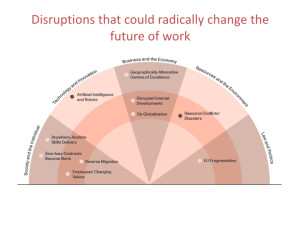There has been much commenting in the press today over a report from from the UK Chartered Institute of Personnel and Development (CIPD) which claims that 58% of UK
university-leavers are entering jobs that do not require a degree, with graduate over-qualification now at “saturation point”.
The Guardian says reports that “the mismatch between the number of university leavers and the jobs appropriate to their skills has left the UK with more than half of its graduates in non-graduate jobs, one of the highest rates in Europe,
The Huffington Post quotes Ben Wilmott, CIPD’s head of public policy, as blaming New
Labour’s 1999 landmark pledge to send 50% of young people to university, and the Government’s failure to create high-skill jobs.
Wilmot called for better careers advice, a renewed emphasis on driving up apprenticeship numbers and a re-think of the disparity between further and higher education funding. “We had the assumption that increasing the conveyer belt of graduates will allow the UK to transition into a higher-skilled economy, but research shows that if you compare graduates and non-graduates who are doing the same or a similar job, skill requirement is not enhanced by the presence of a graduate”, he said.
The report raises a series of issues. Firstly just what is a graduate job. The definition appears to stem from Reasearch by the Institute for Employment Research at warwick Univeristy which led to the division of jobs in the Standard Ocuaptional Classification system used int he Uk into 5 different categories.
1. Traditional graduate occupations
These are the established professions for which a degree has historically been required.
Solicitors, research scientists, architects and medical practitioners are all examples. They typically require the post-holder to be an expert in a very specific area.
2. Modern graduate occupations
The expansion of higher education in the 1960s, and the development of new professional fields in areas such as IT, have resulted in the development of a range of newer professions requiring graduate-level qualifications.
Software programmers, journalists, primary school teachers and chief executives are all examples of modern graduate occupations. They require the post-holders to be ‘experts’, but also often to have more strategic or interactive responsibility than a traditional graduate job.
3. New graduate occupations
These are areas of employment that are often rapidly expanding in today’s labour market. The nature of these jobs has changed relatively recently to mean that the most accepted route into them is via a graduate-level qualification.
Marketing, management accountancy, therapists and many forms of engineer are examples of new graduate occupations. They typically require a higher level of strategic responsibility or of ability to interact with others, and less need for them to be an expert in a topic.
4. Niche graduate occupations
This area is expanding. Many occupations do not require graduate-level qualifications, but contain within them specialist niches that do require degrees to enter.
Nursing, retail managers, specialist electrical engineers and graphic designers all fall into this category. Often they require a combination of skills, such as managerial and expert skills, but equally often the need is for an ‘all-rounder’ with a range of abilities.
5. Non-graduate occupations
All jobs that do not fall into the previous four categories are considered ‘non-graduate occupations’.
Obviously there are questions as to whether objectively a university degree is a necessary or best qualification to be say a physiotherapist or a marketing manager. And does university really teach students to take on “strategic or interactive responsibility”?
Is the expansion in university education in the UK driven by the need for graduates in employment or is the high number of graduates leading to qualification inflation?
At a more macro level it appears that as CIPD chief executive Peter Cheese says there was an “assumption that we will transition to a more productive, higher-value, higher-skilled economy just by increasing the conveyor belt of graduates”, a policy he believes to be flawed. The UK government policy of labour market deregulation may have been successful in creating jobs, but many of these are low paid and part time. Productivity in the UK is stubbornly low.
and knowledge management in the ‘creative accumulation’ innovation model that is based on accumulation of firm-specific knowledge. Besides, lower wage cost pressure will lead to an ageing capital stock, owing to a slow adoption of labour-saving technologies.”
With low productivity and a slow adoption of new technologies, there is simply limited demand for graduate employment. But at the same time university graduation has become almost a rite of passage in the UK. Much has been made of the higher wages that graduates earn during their careers. This is supposed to more that offset the now very substantial university fees in the UK and the resultant high levels of debt on graduating. But of course this represents a historical figure and it is easy to see that such premiums may no longer apply in the future, especially as companies like Ernst and Young announce they will remove a degree from the job recruitment requirements. And despite the rhetoric of developing and promoting apprenticeship routes to skilled work, the reality remains that many of the so called apprenticeships in the UK remain on the low skilled spectrum of employment. And funding cutbacks are particular savage in the Further education (vocational college) sector.
All in all it is hard to see any joined up policy here, apart from a blind belief in austerity and that the markets will sort it out. But it does point to the need for integrated policy making linking education, labour market and innovation policies. That seems to have been absent in any recent Government, Labour, Coalition or Conservative.

